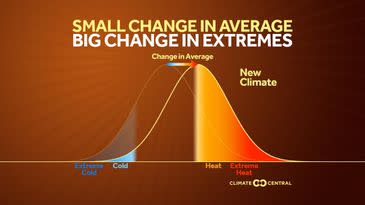America will roast for 4 days
Tens of millions of Americans will feel triple-digit heat between Thursday and Sunday.
The National Weather Service (NWS) noted that 20 to 30 high temperature records could fall between the Rockies and the East Coast. There will be little relief even at night: The weather agency expects 123 records for the warmest daily low temperature to be either broken or tied this week. The Midwest will see many of the highest extremes on Thursday and Friday, while the East Coast will feel its most intense heat on Saturday.
The NWS labeled this excessive heat as "scorching." On Saturday in Washington D.C., the confluence of humidity and air temperatures are forecast to produce a heat index (or feeling) of around 110 F. Meteorologist Michael Ventrice called these forecasted conditions "dangerously hot." Indeed, heat waves kill more Americans than any other weather event.

Although climate change doesn't produce weather — like sprawling fronts of unusually warm air, hurricanes, or wildfire conditions — it does make these events worse. Any heat wave today, for example, is sitting atop boosted global temperatures. These elevated temperatures are responsible for June 2019 being the warmest June in 139 years of record-keeping, and 18 of the 19 warmest years on record occurring since 2001.
This added heat means more record hot weather becoming not just possible, but occurring more frequently. "A barely noticeable shift in the mean temperature from global warming can end up turning a 'once-per-decade' heatwave into a 'once-per-year heatwave' pretty easily," Patrick Brown, an assistant professor in the Department of Meteorology and Climate Science at San Jose State University, said over email.

Shifting averages mean more heat.
The likelihood of extreme heat, like what we are seeing in the US Midwest this week, increases nonlinearly with the warming of average temperatures (caused by increases in anthropogenic greenhouse gas concentrations). pic.twitter.com/Q20frMvgVa
— Patrick T. Brown (@PatrickTBrown31) July 17, 2019
"Heat waves are occurring more often than they used to in major cities across the United States, from an average of two heat waves per year during the 1960s to nearly six per year during the 2010s," noted the U.S. Global Change Research Program.
SEE ALSO: Climate change will ruin train tracks and make travel hell
Boosted temperatures translate to more heat records. In the last decade, for instance, twice as many daily high heat records have been set as daily low records in the U.S.
#NYC has chance for hottest feels like temperature in the country on Saturday but #DC and #Philly will make a run at it also. pic.twitter.com/w6Hl31WhxK
— Bill Karins (@BillKarins) July 18, 2019
The powerful driver of the increased frequency of extreme heat is clear. In the late 1850s, physicists like John Tyndall discovered that certain gases, like carbon dioxide, trap radiative heat on Earth — meaning solar radiation reflected off the planet's surface and heat emitted from Earth itself. Today, atmospheric concentrations of the heat-trapping gas carbon dioxide are at their highest levels in at least 800,000 years, though likely millions of years. What's more, atmospheric CO2 levels are now increasing at rates that are unprecedented in both the historic and geologic record.
"What’s important to recognize is the changes humanity is driving at present are commensurate with the most significant events in the history of life on this planet," Matthew Long, an oceanographer at the National Center for Atmospheric Research, told Mashable in March.


